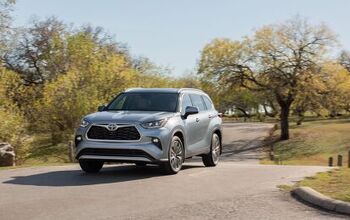Toyota Needs a Certain Model in a Hurry, so Four Guys Are On It

That small-volume, regional roll-out of hydrogen fuel cell vehicles? Yeah, it’s just not doing it for Toyota. The automaker has let development of a fully-electric electric vehicle slide, and now it’s time to play catch-up.
But, rather than saddle the development of a non-hydrogen, non-hybrid green vehicle with the weight of a huge corporate bureaucracy, Toyota has chosen a different route in getting that all-important model to market.
A company within a company. At the table: four people with a mandate to deliver, and the sooner, the better. Call them Toyota’s A-Team. (E-Team?)
Toyota announced an in-house venture company today, run by an individual from each Toyota Group company. That includes Toyota Industries Corporation, Aisin Seiki Co., Ltd., Denso Corporation and TMC.
Describing it is a “virtual organization,” the automaker claims the four members will operate independently from those organizations. The group, company, organization — call it what you want — officially gets to work in December.
According to Toyota, the venture company’s “small organizational structure is meant to enable it to implement unconventional work processes, leading to accelerated project progress and, thus, fast-to-market products.”
The powers that be at the automaker admitted the company hadn’t covered all of its bases. Sure, the Prius hasn’t been ignored (though buyers aren’t giving it the love they once did), and there’s a plug-in Prime variant on the way, but the company’s strong focus on fuel-cell vehicles served to momentarily take its eye off the ball. For the record, the company stands by its pro-fuel cell stance, calling it the best all-around technology for the future.
However, all those pesky other companies and their EVs (existing or pending) tipped Toyota’s hand. It’s the government’s fault, too.
The automaker claims that “differing energy and infrastructure issues around the world and the rapid strengthening of regulations aimed at increasing the use of zero-emission vehicles have heightened the need for product lineups that can respond to various situations.”
What products can the world’s supposedly EV-hungry buyers expect? Toyota hasn’t said, though Japan’s Nikkei newspaper claims the company wants a vehicle with at least 186 miles of range by 2020. Even if the goal come to pass, expect a pack of Toyota’s competitors to cross the finish line first.

More by Steph Willems
Latest Car Reviews
Read moreLatest Product Reviews
Read moreRecent Comments
- AMcA My theory is that that when the Big 3 gave away the store to the UAW in the last contract, there was a side deal in which the UAW promised to go after the non-organized transplant plants. Even the UAW understands that if the wage differential gets too high it's gonna kill the golden goose.
- MKizzy Why else does range matter? Because in the EV advocate's dream scenario of a post-ICE future, the average multi-car household will find itself with more EVs in their garages and driveways than places to plug them in or the capacity to charge then all at once without significant electrical upgrades. Unless each vehicle has enough range to allow for multiple days without plugging in, fighting over charging access in multi-EV households will be right up there with finances for causes of domestic strife.
- 28-Cars-Later WSJ blurb in Think or Swim:Workers at Volkswagen's Tennessee factory voted to join the United Auto Workers, marking a historic win for the 89- year-old union that is seeking to expand where it has struggled before, with foreign-owned factories in the South.The vote is a breakthrough for the UAW, whose membership has shrunk by about three-quarters since the 1970s, to less than 400,000 workers last year.UAW leaders have hitched their growth ambitions to organizing nonunion auto factories, many of which are in southern states where the Detroit-based labor group has failed several times and antiunion sentiment abounds."People are ready for change," said Kelcey Smith, 48, who has worked in the VW plant's paint shop for about a year, after leaving his job at an Amazon.com warehouse in town. "We look forward to making history and bringing change throughout the entire South." ...Start the clock on a Chattanooga shutdown.
- 1995 SC Didn't Chrysler actually offer something with a rearward facing seat and a desk with a typewriter back in the 60s?
- The Oracle Happy Trails Tadge


































Comments
Join the conversation
Oil prices haven't helped spike interest in the Prius, but I can attest to the fact that the styling change has not helped at all.
I am not really seeing what all the fuss for range is about. Regardless of how much range you have, you're ultimately limited by charging stations. My commute is ~80 miles a day total, and my motorcycle gets about 140 to a tank comfortably. If I had something where I could just charge overnight and get ~100-120 miles of range and not have to drive a penalty box like a Leaf I'd consider it.